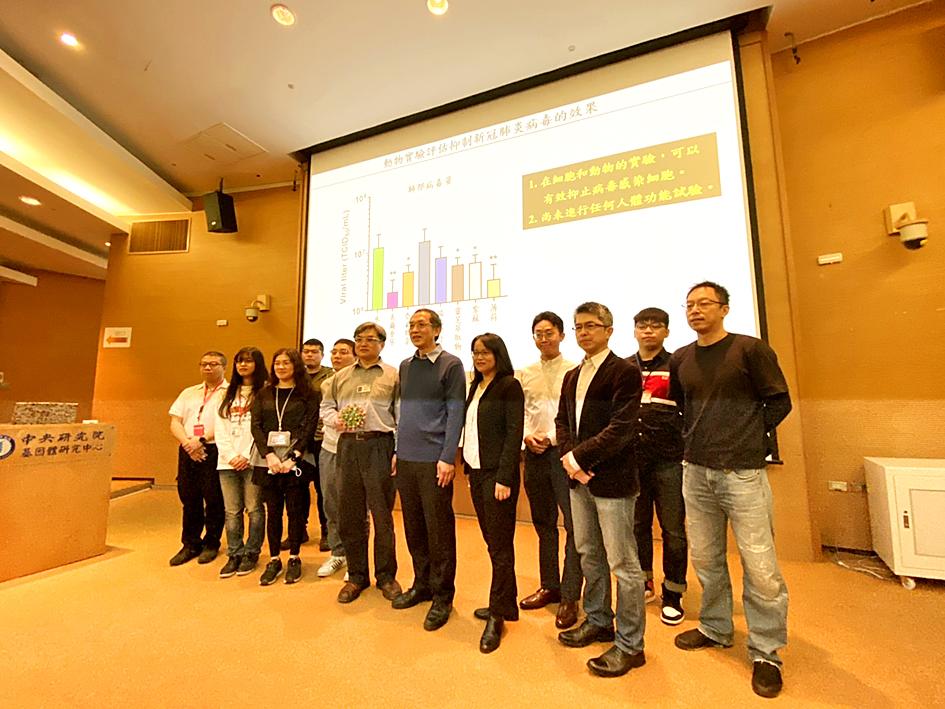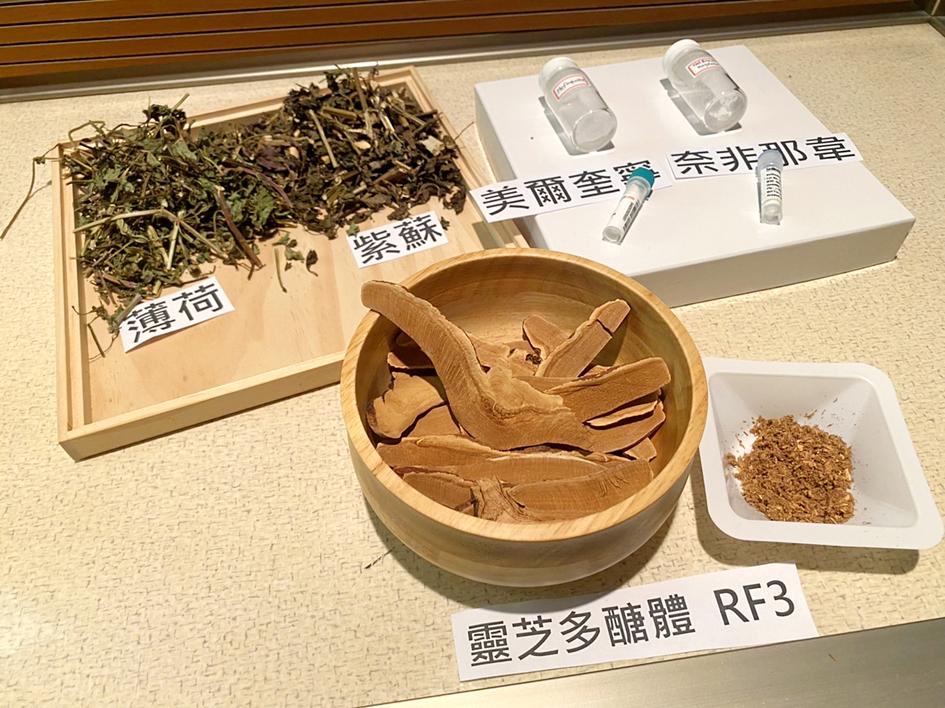Laboratory experiments have showed that five treatments, including three herbal medicines, are potential inhibitors of SARS-CoV-2, a team including former Academia Sinica president Wong Chi-huey (翁啟惠) said yesterday.
The team spoke about its findings at a news conference in Taipei after the study was published in the Proceedings of the National Academy of Sciences of the United States of America journal on Jan. 15.
Academia Sinica President James Liao (廖俊智) in February last year convened a research platform to seek treatments for COVID-19, while Wong and Academia Sinica’s Genomics Research Center director Hung Shang-cheng (洪上程) assembled colleagues to determine whether existing drugs might treat the disease.

Photo: CNA
The researchers obtained the genome of SARS-CoV-2 — the virus that causes COVID-19 — from the Global Initiative on Sharing All Influenza Data and created a computational model, the team said.
More than 1,000 of the 1,273 spike proteins on the virus are likely to mutate, which showed that efforts to create vaccines utilizing traditional processes might be a “wild goose chase,” as the treatment development could never keep pace with the rate at which the virus mutates, the team said.
“The fastest way to help ease the [COVID-19] situation is to find clinically available drugs that can be used to fight off infection,” Wong was quoted as saying in a news release. “They should be oral drugs that people can take themselves when they test positive.”

Photo: CNA
The team examined 2,855 human and animal drugs approved by the US Food and Drug Administration, as well as 190 Chinese herbal medicines that are considered effective to alleviate viral infections, the team said.
After screening the drugs at the institution’s High Throughput Drug Screening Facility and P3 Lab, they narrowed the candidates down to 15, they said.
They created an animal model using golden Syrian hamsters that were exposed to SARS-CoV-2, which were given the candidate treatments twice a day, the team said.
Lung tissue from the animals was examined after three days, they said.
Five candidates stood out in the experiment: Mefloquine, a malaria treatment; Nelfinavir, a treatment for AIDS; and three herbal extracts — Ganoderma lucidum, Perilla frutescens and Mentha haplocalyx, the team said.
While the five candidates showed antiviral effects, the timing of their effects and the way they act differ, meaning further research is needed, National Taiwan University professor of pharmacy Liang Pi-hui (梁碧惠) said.
For example, nelfinavir prevents viral replication by inhibiting protease activities, Liang said.
The next step is to identify active compounds and proper dosages before clinical development could begin, Wong said.

‘DENIAL DEFENSE’: The US would increase its military presence with uncrewed ships, and submarines, while boosting defense in the Indo-Pacific, a Pete Hegseth memo said The US is reorienting its military strategy to focus primarily on deterring a potential Chinese invasion of Taiwan, a memo signed by US Secretary of Defense Pete Hegseth showed. The memo also called on Taiwan to increase its defense spending. The document, known as the “Interim National Defense Strategic Guidance,” was distributed this month and detailed the national defense plans of US President Donald Trump’s administration, an article in the Washington Post said on Saturday. It outlines how the US can prepare for a potential war with China and defend itself from threats in the “near abroad,” including Greenland and the Panama

The Chinese Nationalist Party (KMT) is maintaining close ties with Beijing, the Democratic Progressive Party (DPP) said yesterday, hours after a new round of Chinese military drills in the Taiwan Strait began. Political parties in a democracy have a responsibility to be loyal to the nation and defend its sovereignty, DPP spokesman Justin Wu (吳崢) told a news conference in Taipei. His comments came hours after Beijing announced via Chinese state media that the Chinese People’s Liberation Army’s Eastern Theater Command was holding large-scale drills simulating a multi-pronged attack on Taiwan. Contrary to the KMT’s claims that it is staunchly anti-communist, KMT Deputy

RESPONSE: The government would investigate incidents of Taiwanese entertainers in China promoting CCP propaganda online in contravention of the law, the source said Taiwanese entertainers living in China who are found to have contravened cross-strait regulations or collaborated with the Chinese Communist Party (CCP) could be subject to fines, a source said on Sunday. Several Taiwanese entertainers have posted on the social media platform Sina Weibo saying that Taiwan “must be returned” to China, and sharing news articles from Chinese state media. In response, the Mainland Affairs Council (MAC) has asked the Ministry of Culture to investigate whether the entertainers had contravened any laws, and asked for them to be questioned upon their return to Taiwan, an official familiar with the matter said. To curb repeated

Myanmar has turned down an offer of assistance from Taiwanese search-and-rescue teams after a magnitude 7.7 earthquake struck the nation on Friday last week, saying other international aid is sufficient, the National Fire Agency said yesterday. More than 1,700 have been killed and 3,400 injured in the quake that struck near the central Myanmar city of Mandalay early on Friday afternoon, followed minutes later by a magnitude 6.7 aftershock. Worldwide, 13 international search-and-rescue teams have been deployed, with another 13 teams mobilizing, the agency said. Taiwan’s search-and-rescue teams were on standby, but have since been told to stand down, as